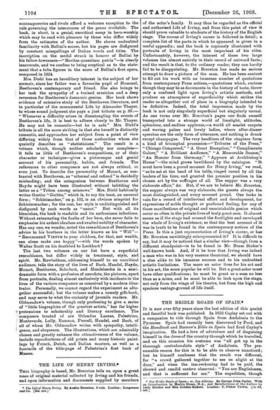THE LIFE OF HENRY IRVING.* This biography is based, Mr.
Brereton tells us, upon a great mass of original material collected by Irving and his friends, and upon information and documents supplied by members
* The Life of Henry Irving. By Austin Brereton. 2 vols. London Longmans and Co. [2SL net.)
of the actor's family. It may thus be regarded as the official and authorised Life of Irving, and from this point of view it should prove valuable to students of the history of the English stage. The course of Irving's career is followed in detail; a complete list of the parts in which he appeared is given in a useful appendix ; and the book is copiously illustrated with portraits of Irving in the most important of his roles. Unfortunately, however, the interest of these two large volumes lies almost entirely in their record of outward facts; and the result is that, to the ordinary reader, they can hardly fail to be disappointing. Mr. Brereton has made no serious attempt to draw a picture of the man. He has been content to fill out his work with an immense number of quotations from contemporary Press notices,—quotations which, curious though they may be as documents in the history of taste, throw only a confused light upon Irving's artistic methods, and produce an atmosphere of superficiality which strikes the reader as altogether out of place in a biography intended to be definitive. Indeed, the total impression made by the book is not only singularly superficial but singularly unreal. As one turns over Mr. Brereton's pages one finds oneself transported into a strange world of limelight, attitudes, splendour, and endless applause,—a world all scarlet carpets and waving palms and lovely ladies, where after-dinner speeches are the only form of utterance, and nothing is drunk except champagne. The very headlines of the chapters form a kind of triumphal procession—" Tributes of the Press," "Chicago Conquered," "A Great Reception," "Compliments Galore," "A Brilliant Audience," "A Memorable Season," "An Honour from Germany," "Appears at Archbishop's House"—the mind grows bewildered by the catalogue. "It must have been a proud moment for Henry Irving," we read, "as he sat at the head of his table, ringed round by all the leaders of his time, and granted the premier position in his chosen art by the suffrages of all. The supper was a very elaborate affair," &c. But, if we are to believe Mr. Brereton, the supper always was very elaborate, the guests always the most distinguished, and every moment proud. One looks in vain for a record of intellectual effort and development, for expressions of noble thought or profound feeling, for any of those manifestions of original and unmistakable genius which occur so often in the private lives of truly great men. It almost seems as if the stage had crossed the footlights and enveloped the whole of Irving's existence, so that the best account of it was in truth to be found in the contemporary notices of the Press. Is this a just representation of Irving's career, or has Mr. Brereton unwittingly misrepresented it ? It is difficult to say, but it may be noticed that a similar view—though from a different standpoint—is to be found in Mr. Bram Stoker's well-known book. And, if it be true that Irving was indeed a man who was in his very essence theatrical, we should have a clue alike to his immense success and to his undoubted artistic limitations. The more an actor lives for his art and in his art, the more popular he will be. But a great actor must have other qualifications; he must be great as a man no less than as a mime, and he must be able to look upon the stage, not only from the wings of his theatre, but from the high and spacious vantage-ground of life itself.






































 Previous page
Previous page